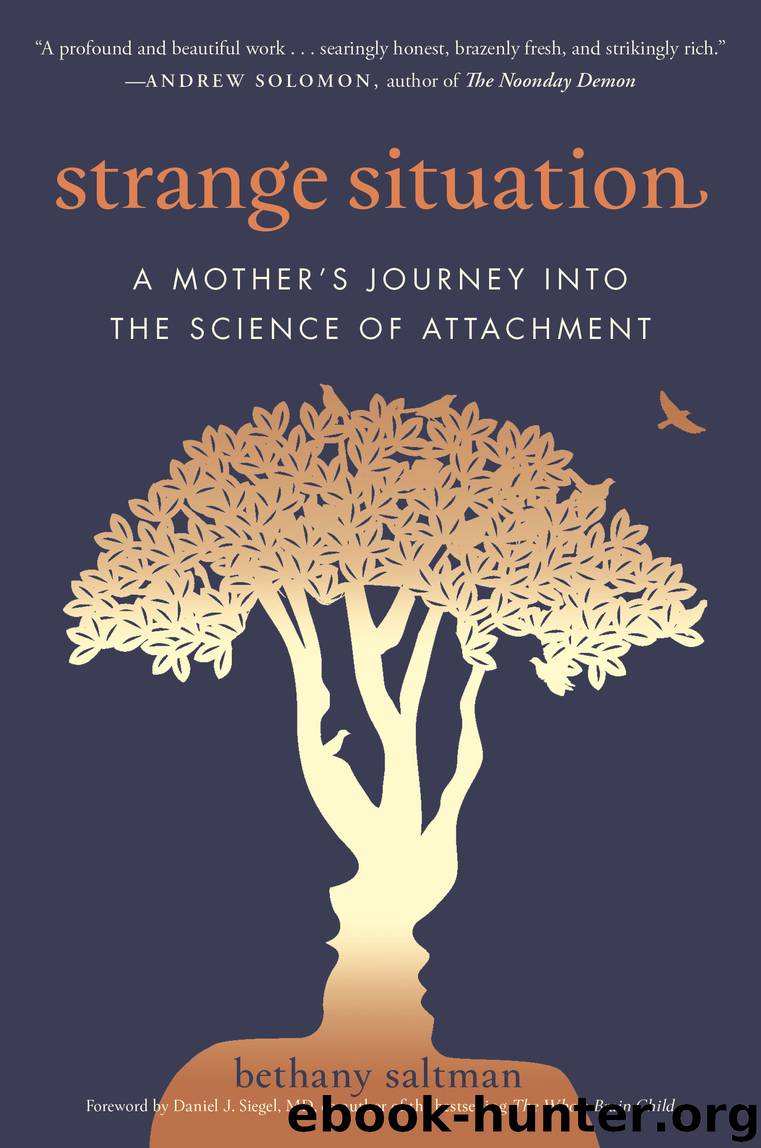Strange Situation by Bethany Saltman

Author:Bethany Saltman [Saltman, Bethany]
Language: eng
Format: epub
Publisher: Random House Publishing Group
Published: 2020-04-21T00:00:00+00:00
* * *
—
WHAT WE LEARNED is that secure adults are able to describe all experiences coherently, whether negative (due to parental rejection or overinvolvement, for instance) or positive. Dismissing adults tend to not remember much, or idealize their parents without being able to come up with any good examples for their overly positive adjectives. Preoccupied adults are still very much involved and preoccupied with their past attachment experiences, getting all wrapped up in past hurts during the interview itself. Dismissing and preoccupied adults are both considered insecure.
From the very beginning of a transcript, looking at the five adjectives a person gives to describe his or her relationship with a parent, one can get a feeling for what kind of transcript it will be. It reminded me of when I used to grade hundreds of student papers a semester. After grading for a few years, I could tell by the first line what grade I would give it. The mark of a secure adult is a mixed set of adjectives—not seethingly negative, which might indicate a level of preoccupation, and not overly positive, which might suggest a defense against the more painful aspects of the relationship, otherwise known as idealizing.
The AAI has been found to give a reliable attachment classification, regardless of the speaker’s intelligence or verbal fluency and regardless of the interviewer. The most articulate, detail-oriented trial lawyer, ordinarily linguistically unflappable, may report that her mother was kind, loving, warm, and fun but have an inability to recall any details to support that story. She might repeat herself or give irrelevant details. This would indicate a possibly insecure/dismissing state of mind, suggesting that the lawyer may well raise an avoidant baby. As Mary Ainsworth discovered in Uganda, it’s the parent’s state of mind in relation to her attachments that determines her child’s attachment security, which develops into that individual’s adult state of mind, which affects his own children’s security. And so on.
Erik Hesse, Mary Main’s husband and an AAI expert, gives a great example in an article in the Handbook of Attachment. As evidence for the adjective “loving,” he offers three different types of responses:
Well, because she was caring and supportive…I guess like, well, you know, she drove me to school, and I was always really proud of her, I mean, she was really pretty, and she took a lot of care with her appearance…
Loving…My mom would stick up for me to the teacher, or to a kid’s parents, or…anybody, really. I could put it another way, too. I just knew where I stood with her, and that she’d be comforting if I was upset or something…
Uh, yeah, sort of very loving at times, like people were in the old days—uh, my youth, lot of changes since then. I remember home, and home was good and that. And, uh, loving, my wife is loving with [child]—taking him out to the movies tonight, special thing he’s been wanting to see all week, dadadada.
Download
This site does not store any files on its server. We only index and link to content provided by other sites. Please contact the content providers to delete copyright contents if any and email us, we'll remove relevant links or contents immediately.
| Acupuncture & Acupressure | Aromatherapy |
| Ayurveda | Chelation |
| Chinese Medicine | Energy Healing |
| Healing | Herbal Remedies |
| Holistic | Homeopathy |
| Hypnotherapy | Massage |
| Meditation | Naturopathy |
| Reference |
Inner Engineering: A Yogi's Guide to Joy by Sadhguru(6793)
The Power of Now: A Guide to Spiritual Enlightenment by Eckhart Tolle(5781)
Fear by Osho(4736)
Ikigai by Héctor García & Francesc Miralles(4274)
The Art of Happiness by The Dalai Lama(4130)
The Ultimate Bodybuilding Cookbook by Kendall Lou Schmidt(3945)
Yoga Therapy by Mark Stephens(3745)
The Little Book of Hygge by Meik Wiking(3693)
The Healing Self by Deepak Chopra(3578)
Why Buddhism is True by Robert Wright(3452)
The Hatha Yoga Pradipika (Translated) by Svatmarama(3341)
Being Aware of Being Aware by Rupert Spira(3276)
Shift into Freedom by Loch Kelly(3197)
Wild Words from Wild Women by Stephens Autumn(3153)
Work Clean by Dan Charnas(3122)
Happiness by Matthieu Ricard(3047)
More Language of Letting Go: 366 New Daily Meditations by Melody Beattie(3027)
Yoga Body & Mind Handbook by Jasmine Tarkeshi(2879)
Why I Am Not a Feminist by Jessa Crispin(2760)
